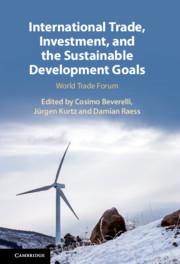‘The perfect sequel to Kurtz's classic The WTO and International Investment Law, but this time converging issues between the trade and investment regimes, on one hand, and sustainable-development goals (SDGs), on the other hand. Beverelli, Kurtz, and Raess offer a pragmatic, case-study-based, interdisciplinary, and comprehensive collection of essays on how to conquer the dungeon of the 2030 Agenda for Development via trade and investment. This is state-of-the-art reading for academics as well as policy-makers who want to avail themselves of the fundamental vectors of development in a post-COVID-19 sustainable world.’
Makane Moïse Mbengue - Professor of International Law, University of Geneva and Sciences Po Paris
‘Twenty-four knowledgeable specialists take a cutting-edge and multidisciplinary approach to disentangling the variety of ways in which globalisation - and, specifically, international trade, foreign investment, and digitalisation - can advance the achievement of seventeen Sustainable Development Goals. The authors critically analyse how governments, the private sector, and both domestic and international institutions can intervene to improve SDG outcomes. This book offers invaluable insights on the politics, economics, and legal challenges involved in achieving sustainable development in the current global economy. It is absolutely essential reading for development scholars, policymakers, and professionals alike.’
Nita Rudra - Professor of Government, Georgetown University, USA
‘The Sustainable Development Goals affect us all, and with exports accounting for over 30% of world output and investment flows well over $1 trillion a year, trade and investment are clearly key to achieving them. This book takes a detailed, multidisciplinary look at the way in which international trade and investment agreements, public bodies and the private sector deal with this key connection. It is packed with insight and thought-provoking ideas. It does not promote simple solutions but rather provides the understanding and analytical base on which future scholars and policymakers should build.’
L. Alan Winters - Professor of Economics, University of Sussex



